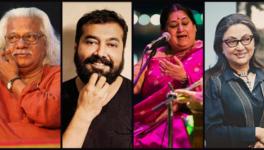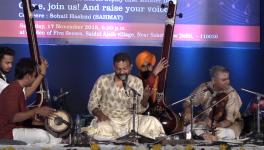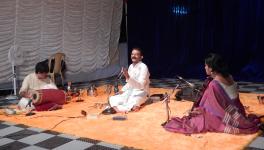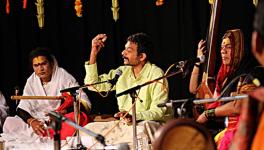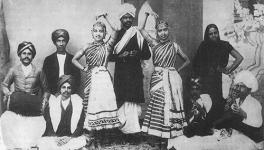TM Krishna: “It is ironic that people who have built this large Hindu temple in a Christian country would take such a decision”
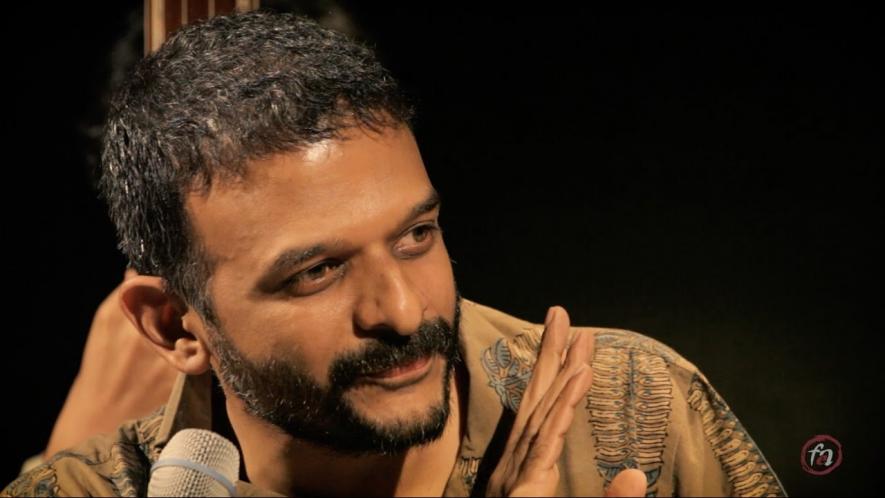
Image Courtesy : YouTube
Carnatic musicians TM Krishna, OS Arun and Nithyashree Mahadevan were recently targeted for attack by the Tamil Nadu based group Rashtriya Seva Sangham for singing devotional songs about “gods of other religions”. In response, Krishna resolved to sing one Carnatic composition every month on Jesus or Allah. The attacks on Krishna mounted, and on his recent tour of the United States, his recital at the Sri Siva Vishnu Temple in Maryland was cancelled.
The Indian Cultural Forum spoke to him about these attacks from the right wing and their appropriation of the rich and diverse traditions of Carnatic music.
ICF: What led to the cancellation of your performance at the Sri Siva Vishnu Temple? Do you think the backlash was due to your decision to sing about Christ and Allah once every month?
TM Krishna (TMK): I learnt about the cancellation through various tweets and saw a screenshot of the SSVT Temple Facebook page. The cancellation happened post my announcement. In fact, this seems to have been the reason for the cancellation. I decided to release one song on Allah or Christ every month because of the terrible trolling and bullying that was unleashed by violent right wing forces on my colleagues for having rendered songs on Jesus or participating in events that were connected to the release of such songs.
ICF: Was the decision to cancel the event one that was carried out by the temple itself or was it a result of pressure from certain groups? If it was the latter, who were they?
TMK: From what I understand the cancellation was the decision of the temple trustees. They were apparently under pressure from various right-wing groups based out of North America. I am not aware of what was going through the minds of the temple trustees. But the very fact that they did not bother to contact me to discuss this issue, even though I have performed there on numerous occasions over the past 20 years, says a lot. I must say here that I sang at Georgetown University on the very day that the concert was to happen at the SSVT temple. This concert was put together by a wonderful group of music aficionados led by Kamala Srikar and Shrikanth Kunhikrishnan who felt that music and musicians should not be curbed. The concert was held at the inter-cultural centre at a Catholic University, supported by Irfan Nooruddin, director of Georgetown University India Initiative and began with an introduction by Dr. Brahmachari Sharan. It was a beautiful evening filled with art, love and sharing that trounced all the negativity that was being spread. It is also important for me to state that my tour organiser Sankritalaya, based out of San Jose, were outstanding in their support.
ICF: Did you expect such a backlash? Do you find it hypocritical?
TMK: I was not surprised by the backlash and it did not bother me. It is ironic that people who have built this large Hindu temple in a Christian country would take such a decision. And to say that Carnatik music kirtanas will be used for conversions as an excuse to cancel concerts is just wrong.
ICF: How do you view this puritanism in Carnatik music among the Indian diaspora in the US?
TMK: Generalisations are dangerous but there is a large section of the diaspora that has over the years become more regressive in their views on religion and culture. These are not just people who migrated decades ago. I find the same tendencies among those who reached North American shores in the 90s and 2000s. Belonging more or less to the same upper-caste strata of society, this homogeneous group over the years has become insular and continuously reaffirms their inner most fears and limited worldview. Their India only consists of people like themselves, the rest become the 'others.' Culture and religion related parochialism is repeatedly shared within the same group. Very soon this becomes ‘the truth’. In today's digital age there is enough on the web to confirm their Hindutva obsessions, not to forget divisive voices such as Rajiv Malhotra who cultivate an angry, rude crowd of followers.
ICF: Carnatik music practitioners of the Indian diaspora in the US often collaborate with artists from other musical traditions. Jazz and Carnatik music have a rich history together. Why does this seem to escape the wrath of the puritans?
TMK: This is very different. You must understand that collaborations are never seen by those who obsess with purity as being the 'real thing.' Therefore when Carnatik musicians share with jazz or fusion sounds it is taken as inter-mingling not something that is representative of ‘pure Hindu culture’. In fact this is paraded as an example of our versatility or superiority. But if the so-called authentic Carnatik music is itself rethought a volcano erupts.
ICF: If Carnatik music is curbed from being reinterpreted or rethought, do you see much of a future ahead?
TMK: There will always be an audience for Carnatik music even if it does not adapt, simply because there are many who think it should just stay this way. But that music will most certainly not evolve. It will not be alive and will not respond to its newer contexts or interact with different people. For someone like me who hopes for a diverse art form in every sense of the word this will be a great disappointment. But I will not give up trying in my own ways.
Get the latest reports & analysis with people's perspective on Protests, movements & deep analytical videos, discussions of the current affairs in your Telegram app. Subscribe to NewsClick's Telegram channel & get Real-Time updates on stories, as they get published on our website.












